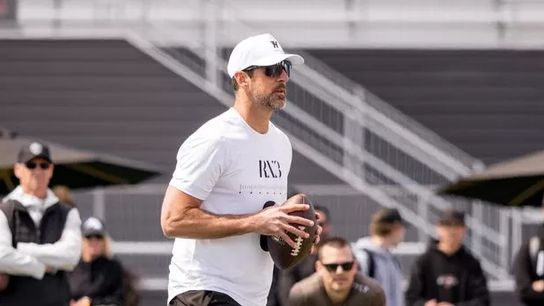The Pittsburgh Steelers haven’t historically been a team that makes impulsive moves. Their legacy is rooted in patience, development, and strategic foresight. So when the team made waves by signing veteran quarterback Aaron Rodgers, eyebrows were raised—but inside the building, the plan had already taken shape.
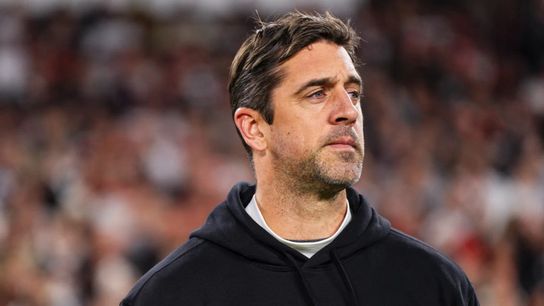
Rolling Stone
Former New York Jets quarterback Aaron Rodgers looking on while being on the sidelines.
Pittsburgh didn’t view this signing as a Hail Mary or a nostalgia-fueled reach for past glory. Instead, they acknowledged Rodgers’ limitations, specifically his age and declining mobility, and committed to building a system tailored to his current strengths. And they aren’t pretending otherwise. ESPN’s Jeremy Fowler elaborated.
“They know the mobility is an issue, they’re not hiding from that,” Fowler said via ESPN’s SportsCenter this week. “So the offensive line is going to have to be good. But in Rodgers’ talks with the Steelers, they were sure that he’s been keeping in good shape. He’s been training out in LA.”
That quote isn’t just a throwaway line—it captures a pivotal truth: the Steelers understand exactly who they’re working with. Rodgers at 41 isn’t the same quarterback who once torched defenses with his legs and flick-of-the-wrist bombs outside the pocket -- and that’s okay. This version of Rodgers doesn’t need to move like he used to, he just needs to move smart.
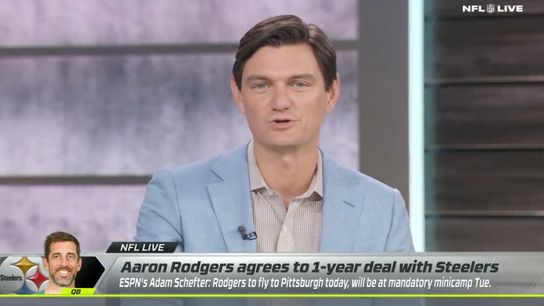
NFL on ESPN
ESPN's NFL insider Jeremy Fowler talks about the Steelers and Aaron Rodgers on TV.
Acknowledging the “mobility issue” up front is rare in a league that often couches aging quarterbacks’ shortcomings in euphemisms. However, the Steelers’ transparency speaks to organizational maturity. They’re not chasing the ghost of 2011 Rodgers—they’re game-planning for the version of him that exists in 2025. The truth is, mobility in today’s NFL isn’t just about scrambling for 20 yards. It’s about navigating the pocket, avoiding sacks, extending plays when needed, and keeping the playbook open beyond quick throws.
Rodgers’ ability to thrive in Pittsburgh hinges on protection. That puts pressure on the Steelers’ front five, who will need to function as a unified, durable, and disciplined group. And while the team has already invested in the trenches, the performance of this unit will now define the offense. Isaac Seumalo, Zach Frazier, and Mason McCormick will need to create a clean pocket consistently. No leaks. No miscommunications. No cheap hits. This isn’t just about giving Rodgers three seconds to throw—it’s about extending his season, preserving his body, and letting him play mentally rather than physically.
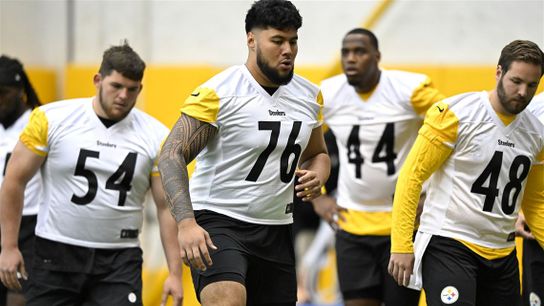
Sebastian Foltz / Post-Gazette
Steelers offensive linemen Troy Fautanu and Zach Frazier work out with the team.
Fowler’s final point in that quote—“he’s been training out in LA”—might seem like a minor detail. It’s crucial. While some veterans take offseason workouts lightly, Rodgers’ decision to stay in shape on the West Coast reflects his buy-in. He’s not coasting into Pittsburgh for one last paycheck—he’s preparing like someone who knows the weight of the expectations ahead.
Rodgers’ overall success also hinges in part on his receivers’ ability to adjust their games. Young wideouts like Calvin Austin III and Roman Wilson will need to master sight adjustments, timing routes, and hot reads. Rodgers demands precision. The room doesn’t need to be loaded with stars—it needs to be filled with students of the game. Rodgers also rewards trust. If a receiver runs the right route and fights for separation, the ball will come. That’s how you keep young talent engaged and growing. The Steelers’ coaching staff is aware of this, which is why early reports from Organized Team Activities (OTAs) have emphasized chemistry building above all else.
Steelers Now Have A Complete QB Room
Let’s not forget what this means for the rest of the quarterback room. With Rodgers as the clear QB1, the backup competition heats up. Mason Rudolph and Will Howard aren’t just insurance—they’re understudies. Watching how Rodgers prepares, how he diagnoses plays—this is invaluable for their growth. And in the event Rodgers misses time, the offense is being built in such a way that it can still function with a more mobile QB. That’s smart planning.
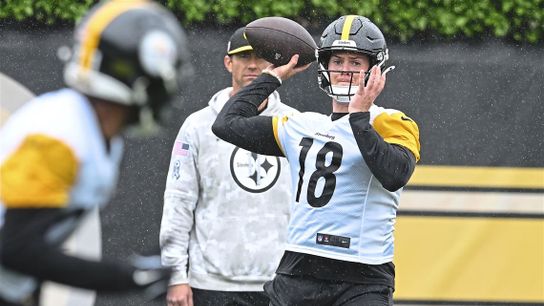
Pittsburgh Post-Gazette
Steelers' Will Howard getting reps during 2025 offseason programs.
The Steelers aren’t promising the world. They’re offering a fair fight. With Rodgers as a seasoned general, they’re not pretending to have a dual-threat marvel. They’re building from the inside out, prioritizing protection, trust, and execution. Fowler’s quote—especially the part about the offensive line having to be good—hits like a warning shot. If this team isn’t disciplined in the trenches, things can unravel quickly. However, if they execute, Rodgers has more than enough left in the tank to lead a playoff push.
What do you think Rodgers' time in Pittsburgh will look like? Let us know in the comments!
#SteelerNation

